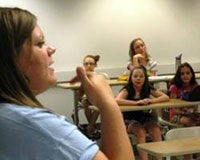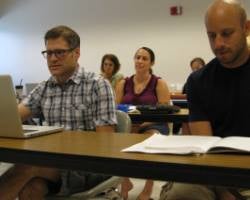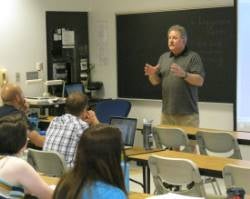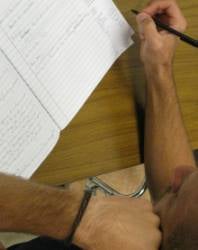
Shannon Styers teaching the Young Writers Camp last summer.
The Denver Writing Project might best be described by one of its teacher-leaders: "I can have the hardest, craziest week and I can walk into any Denver Writing Project event and feel invigorated as a teacher. I've never found that with anything else," says Shannon Styers, an ESL teacher at Goddard Middle School. With years of cuts in education funding and the multitude of other challenges faced by teachers today, thoughtful programs aimed at helping teachers excel are hard to find. The Denver Writing Project works by harnessing teachers' natural enthusiasm, creating supportive environments where teachers become writers themselves, and ultimately making Denver-area students the beneficiaries.
The Denver Writing Project (DWP), sponsored by CU Denver and the College of Liberal Arts and Sciences, believes that every student, from kindergarten through university graduate study, deserves to learn to write from a top-notch teacher. The project is based on the premise that the best writing teachers are teachers who write. As a result, Denver area educators are selected to spend part of each summer on the Auraria campus working from a teachers-teaching-teachers model. The National Writing Project (NWP), of which DWP is an affiliate, was established in 1973 and has nearly 200 sites in all 50 states. Over 50,000 teachers participate each year in their programs. To date, more than 200 educators have participated in the DWP Summer Institutes, and have taken the knowledge gained back to classrooms in the Denver Metro area and throughout Colorado. In addition, over 200 young people come to the Auraria campus each summer to spend a week focused directly on developing as writers. English Instructor Nicole Piasecki, Director of CU Denver's DWP, says, "DWP is filling a real need—for teachers to be acknowledged and for their professional opinion to be respected. We trust teachers to be the professionals that they are. We create teacher-leaders, who work on the craft of teaching and then take that craft to their respective schools."

Teachers sharing their writing at the 2013 ISI.
While 25 active leaders organize and plan key programs for the DWP, English Instructor of Rhetoric and Composition Instructor Miranda Egger serves as its Advocacy Coordinator, and agrees: "Sometimes, in schools there isn't much time to think, collaborate, work together to continue to be progressive in literacy. Teachers are being asked to do so much right now. DWP is a think tank to improve their practice. They come together to share ideas." Egger feels strongly that teachers need a place to be lifelong learners. She says, "One key question that the organization likes to ask is, ‘What happens when teachers read, write and learn together?' The answer: Magical things happen when teachers collaborate, when they're given the space, time and support to share their professional practices. This is the heart of the organization."
Each year, roughly twenty teachers commit three weeks of their summer to the Invitational Summer Institute (ISI) program, the hub of DWP's efforts, which this year runs June 9–27. Participants in this summer's ISI will come from all levels of education, K-16, from public and private schools, and from every discipline. The only unifying criteria will be that each participant has shown a professional commitment to the teaching of writing and a personal commitment to developing as a writer. DWP's organizers understand that, for teachers, this is a labor of love. This select group will opt to spend three weeks of eight-hour-days in the Plaza Building, becoming even better teachers through professional development. The dedication demonstrated through this commitment pays off in classrooms around Denver, as students reap the benefits of learning from this re-invigorated and re-inspired group of teacher-writers.
For those who dedicate their time to running the DWP, it all comes down to a simple fact: writing matters. Egger stresses that writing is an integral skill to have no matter what students are writing about, adding, "The best writing teachers are teachers who write. And every teacher, no matter what discipline they teach, is in some ways a writing teacher." The ISI is open to all educators, be they English instructors, ESL specialists or science teachers, and Egger has seen firsthand the changes that occur among participants of the ISI. She says, "Teachers come in afraid of writing sometimes, wanting to get comfortable with the practice themselves. Putting ourselves in our students' shoes, we remember how hard it is, how vulnerable writing can leave you. We, in turn, are better teachers of writing."

Richard Argys instructing at the 2013 ISI.
Kyle Kimmel, Third Grade Teacher at the Montclair School of Academics, talks about how much he dreaded teaching writing in his science classroom, and how he was inspired to attend the summer institute to help him manage that dread. He knew teaching writing was important, but felt ill-equipped to take on the task, saying, "At the time I knew how much I hated teaching writing, it was one of those things where, if I didn't have to teach writing, my day would be great." After putting himself "out-there" by participating in the ISI, Kimmel says, "I finally learned to think of myself as a writer." In turn, he now helps his students see themselves as writers, as well.
Jessica Cuthbertson, a Sixth Grade Teacher at Vista Peaks Exploratory, remembers, "I was, as a middle school teacher, sitting with a group of about 20-30 other teachers who spanned everything from kindergarten to college, and so I think the Denver Writing Project does a really nice job of recruiting a variety of teachers." She goes on to relate, "One of those colleagues, who participated in Denver Writing Project a few summers before me, we co-presented at a conference together recently. Her ideas and her practices of using info-graphics to present principles of argumentation – she did that with eleventh graders – is something I that I found I could modify and use for my sixth graders. And I never would have tried that genre, or approach, or felt like I could take a risk, if it hadn't been for that experience."
The ISI creates teacher-leaders through its grassroots efforts, and those teachers go on to advocate in their home institutions, inspiring other teachers. Making sure that the fires lit at ISI keep burning, specialized and follow-up courses for alums guarantee the skills gained over that first summer can be refreshed and applied in exciting ways. An Advanced Institute is offered each year, inviting back past participants and giving them a chance to build on the skills they've acquired. Likewise, the TechMatters Institute allows alumni and other Denver-area teachers to further develop technology-based units to implement in their classrooms.

Young Writers engaged in their craft at the 2013 YWC.
In addition to helping teachers grow as writers, teacher-leaders from the DWP use their skills to do the same for kids over the summer, by bringing groups of students together to focus on writing. The DWP Young Writers Camp (YWC) is a one-week opportunity for students going into grades 5–12 to develop as authors of diverse projects. Auraria is the primary site for the camps, with satellite camps in Cherry Creek and Jefferson County school districts. The program itself continues to grow in popularity and gain momentum each year, with over 200 students expected to participate this summer, up from 90 in 2011. On June 9–13, camp will run from 9:00 am to 3:00 pm each day. On Friday, the young writers invite family and friends to a celebratory presentation of their works from the camp. Applications are still being accepted for YWC this year—click here for application information.
"I have been part of the DWP Young Writers Camps since 2006, and I'm so proud of how our camps have grown and the opportunities they provide for young writers across the metro area," says Sarah Woodard, Co- Director of the Young Writers Camp on the Auraria campus. "One of the most significant accomplishments of our camps is that we provide a fun, safe place for writers of all ages and backgrounds to come together and share their love of writing. The young writers create friendships that they maintain long after the week of camp ends. One of the many highlights of camp is that the young writers have the opportunity to engage in writing workshops with professional writers such as Dom Testa and Jovan Mays." Over the summer, the DWP will also host several guest author events which are open to the public. CU Denver faculty, staff and alumni, as well as Denver area residents, are encouraged to attend.

A Denver Area Teacher at the 2013 ISI putting what he learned into action.
While today's funding climate makes running the DWP more of a challenge than ever, Egger and her colleagues are dedicated to seeing it persist and flourish. When the DWP came to CU Denver in 2000, under the direction and guidance of Associate Professor of English Richard VanDeWeghe, Colorado had four affiliates of the NWP; only two of those programs have survived. Established in 1991, the NWP was authorized as a federal education program with dedicated funding. Prior to 2011, funding provided to the DWP by the federal government was matched by funds from CU Denver and CLAS. Because of budget cuts in 2011 which eliminated guaranteed federal funding, the DWP now has to fight each year to remain operational. A team of DWP advocates, including Egger and Richard Argys, Senior Instructor of English Education for the School of Education and Human Development, flew to Washington, DC in March to meet with legislators and advocate for continued opportunities to compete for federal SEED (Supporting Effective Educator Development) grant funding. Says Egger, "Our funding each year is competitive. We compete for federal grants as well as private grants so that we can continue to provide dedicated services to Colorado teachers (services like: Title I support, creating college- and career-ready students, applying and understanding the common core standards, integrating technology in the classroom). We've continued to successfully compete for grant money for the last 3 years. We have gotten money from the Carnegie Foundation, Jefferson Grant and Bill and Melinda Gates Foundation, as well as SEED federal grant funding."
The more people know about the important work being done on campus and beyond, the more Egger believes support for DWP will continue. Egger stresses that none of the DWP's work would be possible without the support of the Provost's Office and CLAS, in the form of direct funding, as well as office space, classroom space, technology access and leadership funding. She says, "We don't exist without the university's foundational support, allowing us to make the space and time for the ISI—the hub of the wheel of this organization—that serves to empower Denver-area teachers to create and share their practice with one another. I'm proud to be a part of such a powerful network of smart, hard-working and innovative teachers."
